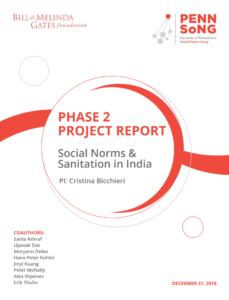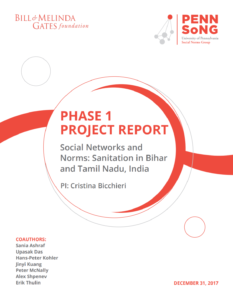Norms in the Wild
Is it possible to change social expectations around forced marriage, genital mutilations, and public health practices like vaccinations and sanitation? If so, how? What tools might we use? This short book explores how social norms work, and how changing them – changing preferences, beliefs, and especially social expectations – can potentially improve lives all around the world.
Grammar of Society
Drawing on several intellectual traditions and methods, including those of social psychology, experimental economics and evolutionary game theory, Bicchieri provides an integrated account of how social norms emerge, why and when we follow them, and the situations where we are most likely to focus on relevant norms.
Nadar en Contra de la Corriente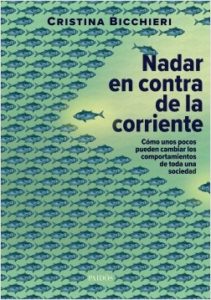
2019 Spanish translated version of Bicchieri’s Norms in the Wild (2016). A partir de una rigurosa investigación, Cristina Bicchieri ofrece en estas páginas elementos para entender cómo se relacionan las acciones individuales con los comportamientos grupales, y comprueba con evidencias que es posible transformar una sociedad a través de la educación y mediante las actuaciones individuales.
UNICEF-Mali: Normes sociales liées à Le mariage d’enfants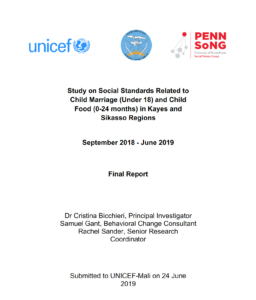
This report aims to analyze social norms related to child marriage and the eating habits of children under the age of 2 in the Sikasso and Kayes regions. The results of the study will enable UNICEF to better inform its chapters and Mali to better understand the socio-cultural dynamics that hinder the change of gender in relation to child marriage, exclusive breastfeeding and complementary feeding.
Social Determinants of Open Defecation: Phase Two Materials
In the second phase of our study of the social determinants of open defecation in India, we have produced a report detailing our diagnosis of a series of collective behaviors relevant to open defecation. We also describe patterns among our norms data to previously collected social network data. Furthermore, we track changes over time and other relevant patterns.
Collective Action on Corruption in Nigeria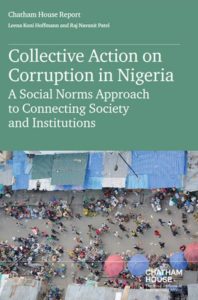
This report aims to diagnose what drives corrupt behavior in Nigeria, and the types of beliefs that support practices understood to be corrupt. The findings present new evidence of the social beliefs and expectations that influence some day-to-day forms of corruption in Nigeria. Fuller details of the survey and associated research are given in the body of the report, as well as in an annex.
Applying Social Norms Theory in CATS Programming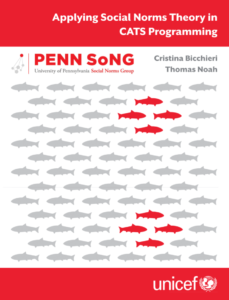
The primary goal of this document is to provide the necessary information on the importance, nature and application of the theory of social norms to sanitation specialists. This document distills insights from joint collaborations with UNICEF, and aims to promote positive social change with regard to many harmful collective patterns of behavior related to sanitation.
Social Determinants of Open Defecation: Phase One Materials
In the first phase of our study of the social determinants of open defecation in India, we have produced a report detailing how social networks influence latrine ownership. We also explore demographic predictors of ownership and use and how our findings differ from existing literature. We explore how these network data link to norms data in our Phase 2 report.
Social Norms Manual: Zimbabwe and Swaziland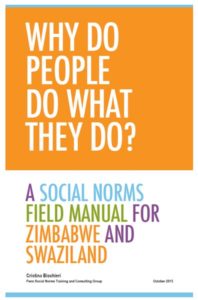
A Social Norms Manual produced for Zimbabwe and Swaziland as part of the UNICEF Office of Research’s Multi-Country Study on the Drivers of Violence Affecting Children. This manual serves as a guide to key concepts in the social norms framework with examples pertaining to the countries and programming areas.
Social Norms Manual: Viet Nam, Indonesia and the Philippines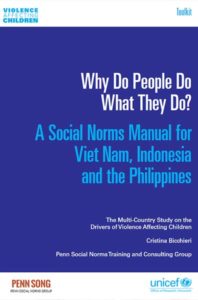
Drawing on several intellectual traditions and methods, including those of social psychology, experimental economics and evolutionary game theory, Bicchieri provides an integrated account of how social norms emerge, why and when we follow them, and the situations where we are most likely to focus on relevant norms.
UNICEF Pakistan: WASH Sustainability Check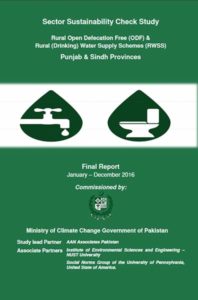
This study focuses on Rural ODF Status (exclusive latrine use in ODF certified villages – behavioral sustainability) and continued functionality of RWSS (drinking water only) in the geographic region of two provinces in Pakistan, Sindh and Punjab. Our chief role was to develop, integrate and analyze social norms measures as part of the larger sustainability check. This report presents those methods, measures and findings.
COVID-19 in India: Immense Role for HealthCare Field Workers
Ashraf, S. (2020, April 1). Retrieved from https://delhipostnews.com/covid-19-in-india-immense-role-for-healthcare-field-workers/
How Trendsetters Shaped India’s Massive Sanitation Campaign
Bicchieri, C., McNally, P., Ghai, S., & Patel, R. (2019, September 20). How Trendsetters Shaped India’s Massive Sanitation Campaign. Retrieved from https://knowledge.wharton.upenn.edu/article/trendsetters-shaped-indias-massive-sanitation-campaign/.
Deviant or Wrong? The Effects of Norm Information on the Efficacy of Punishment
Bicchieri, C., Dimant, E., & Xiao, E. (forthcoming).
Female genital mutilation: Fundamentals, social expectations and change
Bicchieri, C. & Marini, A. (forthcoming).
Bad luck or bad intentions: When do third parties reveal offenders’ intentions to victims?
Hart, E., Mellers, B. A., & Bicchieri, C. (2019). Journal of Experimental Social Psychology.
Shrieking sirens: Schemata, scripts, and social norms: How change occurs
Bicchieri, C., & McNally, P. (2018). Social Philosophy and Policy, 35(1), 23-53.
Norms, conventions, and the power of expectation.
Bicchieri, C. (2015). In N. Cartwright & E. Montuschi (Eds.), Philosophy of social science: A new introduction (pp. 208-232). Oxford: Oxford University Press.
On the emergence of descriptive norms.
Muldoon, R., Lisciandra, C., Bicchieri, C., Hartmann, S., & Sprenger, J. (2014). Politics, Philosophy & Economics,13(1), 3-22. doi:10.1177/1470594X12447791
A social norms perspective on child marriage,
Bicchieri, C., Lindemans, J.W., & Jiang, T. (2014). UNICEF.
Norm manipulation, norm evasion: experimental evidence.
Bicchieri, C., & Chavez, A. K. (2013). Economics and Philosophy, 29(02), 175-198.
An Embarrassment of Riches: Modeling Social Preferences in Ultimatum Games
Bicchieri, C., & Zhang, J. (2012). In U. Maki (Ed.), Handbook of the Philosophy of Science: Philosophy of Economics. Elsevier.
Social Norms
Bicchieri, C. & Muldoon, R., (2011) The Stanford Encyclopedia of Philosophy
Norms, preferences and conditional behavior.
Bicchieri, C. (2010). Politics, Philosophy and Economics, 9(3), 297-313. doi: 10.1177/1470594X10369276
COVID-19 and Toilet-use in India: Why Continued Attention is Needed?
Ashraf, S. (2020, April 27). Retrieved from https://delhipostnews.com/covid-19-and-toilet-use-in-india-why-continued-attention-is-needed/
Nudging with Care: The Risks and Benefits of Social Information
Bicchieri, C., & Dimant, E. (2019). Public Choice, forthcoming.
It’s Not A Lie If You Believe It: Lying and Belief Distortion Under Norm-Uncertainty
Bicchieri, C., Dimant, E., & Sonderegger, S. (forthcoming).
Norm Change: Trendsetters and Social Structure
Bicchieri, C & Funcke, A. (2018). Social Research: An International Quarterly, 85(1), 1-21.
Game-Theoretic Accounts of Social Norms: The Role of Normative Expectations
Bicchieri, C., & Sontuoso, A. (2017). In R. Croson, M. Capra, M. I. Rigdon, & T. Rosenblat (Eds)., Handbook of Experimental Game Theory. Edward Elgar Publishing.
Can trust facilitate bribery? Experimental evidence from China, Italy, Japan and the Netherlands
Bicchieri, C., Willem, J.W., & Jiang, T. (2015). Social Cognition, 5, 484-504.
Norms and beliefs: How change occurs.
Bicchieri, C. & Mercier H. (2014). In M. Xenitidou & B. Edmonds (Eds.) The complexity of social norms (pp. 37-54). New York, NY: Springer International Publishing.
Why are there descriptive norms? Because we looked for them.
Muldoon, R., Lisciandra, C., & Hartmann, S. (2014). Synthese, 191(18), 4409-4429.
A structured approach to a diagnostic of collective practices.
Bicchieri, C., Lindemans, J.W., & Jiang, T. (2014). Frontiers in Psychology, 5, 1418.
Is participation contagious? Evidence from a household vector control campaign in urban Peru.
Bicchieri, C. & Buttenheim, A. (2013). Journal of Epidemiology and Community Health, 68, 103-109.
Trustworthiness is a social norm, but trusting is not.
Bicchieri, C., Xiao, E., & Muldoon, R. (2011). Philosophy, Politics and Economics, 10(2), 170-187. doi:10.1177/1470594X10387260
Behaving as expected: Public information and fairness norms.
Bicchieri, C. & Chavez, A. (2010).Journal of Behavioral Decision Making, 23(2), 161-178.
Do the right thing: but only if others do so.
Bicchieri, C. & Xiao, E. (2009). Journal of Behavioral Decision Making, 22(2), 191-208.

